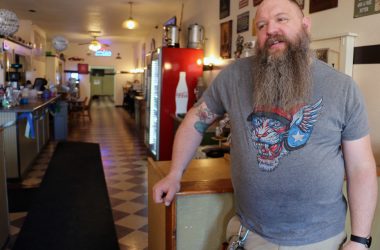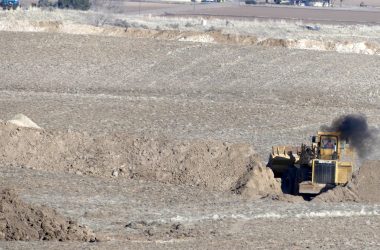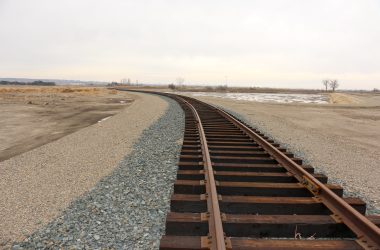VALE – Government officials gathered around the table in March to hear details about one of the biggest industrial projects ever proposed for Vale.
Among those attending was Vale Mayor Mike McLaughlin, two officials from the Oregon Employment Department, Dana Young, president of Treasure Valley Community College, and one of her vice presidents, Eddie Alves. They listened as representatives of Dignition Enterprises, a nonprofit, explained how they would put more than 100 people to work in Malheur County. They would build a waste-to-energy plant, taking 80 tons of material destined for landfills and turn it into diesel. The diesel would generate steam and electricity to power a new soup factory. The soup factory would buy from local farmers and ranchers to make 120,000 pounds of soup a day. The project would cost $25 million.
“It’s a huge project,” said Kit Kamo, executive director of Snake River Economic Alliance. “It’s an exciting project.”
“We’re excited about the jobs” forecast, said McLaughlin.
“They love the idea,” said Leo Cristaldi, CEO of Dignition Enterprises.
But his nonprofit has never made soup or anything else. In fact, it formed barely a month before its leaders were pitching Oregon and local officials.
A week after the March 15 meeting, Dignition wrote government officials asking about public money for a feasibility study.
The state now is considering providing $30,000 for that work, a state official said.
Dignition also asked about a $5 million loan from the city of Vale and another $10 million from state bonds. The first $5 million would get the first phase of the project up and running “while the applications for further funds are in process.”
McLaughlin said the nonprofit had wrong information. He said Vale has only $1 million in a fund for economic development and no more than $100,000 can go to a single project.
“They kept talking about grants – free money,” McLaughlin said.
Dignition said nothing in its materials about how much money it had to put into the Oregon operation. Eliana Molz, the wife of the CEO and a director of the charity, said in an interview they were “not at liberty to discuss” what money the charity had on hand.
The prospect of a new major employer would be welcome news for Malheur County officials. They have watched as companies elected to build across the river in Idaho, where costs are lower. They have wanted new jobs to help pull the county out of the ranks of the most impoverished in Oregon. And they work hard to chase such opportunities.
Malheur County has its own economic development arm, run by Greg Smith, and Ontario city officials have bolstered their staffing to push development projects. A third player is the economic development alliance, which recruits businesses to the area and opens the door to government for entrepreneurs and business executives.
“Our job is to make sure they connect with the right people,” Kamo said.
She said she doesn’t gather any background information on those who approach her about expanding or locating businesses in the area.
“I honestly don’t critique them,” she said, leaving such work to agencies that will do vetting as they consider public funding.
Kamo was unhappy when she learned the Malheur Enterprise had been questioning those proposing the soup factory, saying the approaches put “Project Soup” at risk.
Behind the project is a tangle of companies and individuals stretching from coast to coast and even overseas.
The key figure is Cristaldi, who lives in North Carolina and incorporated Dignition Enterprises in that state on Feb. 13. He said it is a tax-exempt nonprofit.
In an interview, Cristaldi said he grew up in Brazil, traveled the world as a teenager, and earned an MBA from a university in England. He said he also ran a honey importing business for a time, selling it because of his personal health problems.
His said he is experienced with waste-to-energy projects of the type he envisions for Vale.
“We had a similar project running in Brazil” about five years ago, Cristaldi said. “This would be the first one in the United States.”
He said the Brazil project didn’t go as he wanted and he “passed” the project to others he wouldn’t identify. He wouldn’t provide details of the project, such as where it is located.
Jim Helfrich, a Montana businessman, said he participated in the Brazil project because “I get involved in deals all over the world.”
He said the Brazil project was “never built.” He said a change in national government ended the project “because of the way they do things in Brazil.”
Helfrich said he introduced Cristaldi to Malheur County officials.
He knew about the area from an earlier unsuccessful effort to put in a large processing operation west of Vale.
That was done through a company called Westfall Family Farms. His partner in the business is David M. Brockes, a former Montana resident now living in Iowa who said he retired from the Coast Guard.
In a 2014 Facebook post, Brockes described the Oregon livestock project as operating on 172,000 acres with 900,000 head of livestock and employing 770. He said Stanford University and Massachusetts Institute of Technology helped designed barns.
“All plans and initial partners for ground breaking and first stage construction are in place,” Brockes wrote.
There was no ground breaking.
Kamo recalled the livestock project, saying it died because Westfall Family Farms couldn’t get federal tax credits.
Helfrich blamed issues over sage grouse habitat.
Brockes said last week that the livestock project would cost $53 million and “we’re trying to secure funding to move that project ahead.”
He said Westfall never sought government grants.
“The problem with applying with most of the grants is you have to have a percentage of cash to float into it,” Brockes said. “Unfortunately, my retirement pay doesn’t quite cover that kind of investment.”
He said he’s relied on second mortgages and loans from family for “all of these projects” he has worked on over the years.
Helfrich said he remembers Malheur County as “a community that was very economically depressed. I saw an agricultural system that showed a tremendous amount of pride.”
He recommended Cristaldi take the soup project to Malheur County.
“Vale came to our attention because of the high level of poverty in the county,” Cristaldi said. “We want to go where no one else wants to go.”
Cristaldi said he worked previously with nonprofits but he would “rather not name the organizations.”
Dignition described itself in material given to local officials as “a creatively minded foundation that pursues lasting economic and social advancement creating self-sustainable projects.”
The Vale project, it said, “will address environmental issues, offer technical education, job creation and help to fight hunger worldwide.”
A key is the waste-to-energy plant which Dignition said would divert plastics and tires from landfills for processing into diesel fuel.
Such equipment, Cristaldi said, is up and running in Nevada.
Helfrich, in an initial interview, said that Westfall does “have waste-to-energy projects. We have one in Henderson, Nevada. It’s been in operation for five years.”
He said it was a run by Logicalfuels, which he described as a subsidiary of Westfall Farms.
The website for that company was included in materials given to officials in Oregon, identifying Logicalfuels as the source of equipment for the Vale operation.
The website last week contained just a single page with a company logo and referenced yet another company, WWS LLC.
Helfrich said the owner told him he had recently removed most information from the site because he “doesn’t have time to fool with inquiries.” The owner, Ralph Wojtowicz, said in an email Monday that the website “is not a focus for us at this time.
“We are focused on the many projects currently working on to help reduce and process the waste products going into our landfills that can take thousands of years to degrade,” he said in his email.
The Nevada plant is indeed a waste-to-energy operation, according to Nevada state records. It opened in 2012 and converts waste such as old casino carpeting into diesel. The company is licensed to store up to 20,000 gallons of fuel, Wojtowicz said.
Helfrich said in a second interview that Westfall Family Farms didn’t own the Nevada operation but was in a “joint venture.” He said Westfall had the right to the technology which he said is proprietary and no photographs or tours could be allowed.
The relationship between Westfall Family Farms and Dignition isn’t clear.
Helfrich said the business relationship between the two is “kind of confidential” and “we are acting as a consultant to them.”
Molz, one of Dignition’s directors, said Helfrich was simply doing a favor for the charity.
“We do not have any relationship with Westfall,” she said.
In the email to government officials last month, Cristaldi said some of the $5 million being sought to start the Vale project would go to Westfall.
“Westfall will use part of it to secure the land and prepare all blueprint, licenses and permits,” for the project.
He said when Dignition started operating profitably, the Vale city loan could be paid and the money reinvested – including into Westfall Family Farms for “a grain shipping and receiving station, a panel factory, and a manufacturing plant.”
Reporter Jayme Fraser contributed to this story.
Les Zaitz: [email protected], 541-473-3377.
FOR $5 A MONTH, GET A DIGITAL SUBSCRIPTION: SUBSCRIBE NOTE: WE DON’T RETAIN OR SHARE YOUR CREDIT CARD INFORMATION WHEN YOU SIGN UP.



